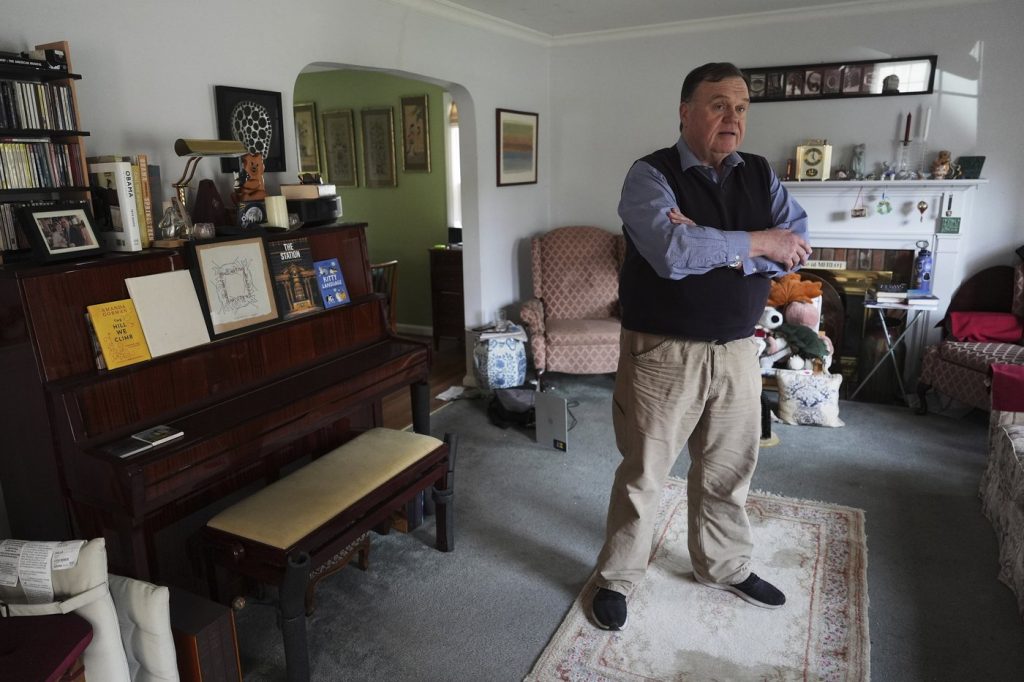NEW YORK (AP) – As financial instability looms due to the ongoing trade war initiated by the White House, many retired and near-retired Americans are expressing growing anxiety about their retirement savings. Michael Montgomery, a 66-year-old professor from Huntington Woods, Michigan, admits he no longer checks his retirement account, opting instead for emotional peace as market fluctuations create uncertainty regarding his financial future.
Montgomery, who has made adjustments to his portfolio by shifting more funds into bonds, is apprehensive about what further actions he can take in light of volatile economic conditions impacted by government decisions. “I hope like hell I don’t lose all my retirement savings,” he states, expressing a sentiment that resonates with many older Americans concerned about outliving their savings.
The uncertainty in the market has led others, like 71-year-old Jeanne Oats Estridge from Dayton, Ohio, to contemplate drastic measures such as moving all her investments into cash. Estridge, a retired software engineer turned author, is frustrated with the decline in her retirement account by over $40,000. Displeased with government responses to market volatility, she challenges the feasibility of purchasing stocks during turbulent times, posing the rhetorical question of where she is expected to find the money to invest.
The Cboe Volatility Index, known as the “fear gauge” of investor sentiment, recently reached its highest point in five years before slightly retreating but still indicates a state of fear among investors. President Trump, in addressing the turmoil, has downplayed the situation, suggesting that people remain calm and not overly focused on the day-to-day market fluctuations.
Despite this calm approach from leadership, older investors are feeling the stark reality of their financial situations. Peter Rost, 72, who retired from his software development role, is hesitant to withdraw from his retirement account due to significant losses. Having experienced downturns in the past, he finds himself in a different position now, needing to draw from his savings while the market is down. “Make sure I don’t run out of money before I die,” he explains as his primary goal.
Statistics show that American retirement savings totaled approximately $44 trillion at the end of 2024, reflecting a significant shift towards stock investments through vehicles like 401(k) plans. Many older investors remain heavily invested in equities, with Vanguard data showing that individuals aged 65 and older have about 49% of their savings in stocks.
Amid market uncertainty, financial advisors are witnessing a surge in inquiries from older clients worried about their future. Tj Binkowski from Narrow Road Financial Planning remarks on the emotional strains of market dips for retirees, highlighting the critical difference between paper losses for working individuals and real losses for those drawing from their accounts. “When you’re retired, paper losses aren’t just on paper anymore,” he remarks.
Paul Duesterhaus, a 68-year-old retiree from Quincy, Illinois, has chosen to forgo withdrawals from his IRA this year, deciding instead to delay other purchases to avoid selling at a loss. He anticipates that the effects of the trade war could be far-reaching, impacting all Americans in the long run.
Older adults appear more affected by market volatility than their younger counterparts. An April poll indicated that nearly half of U.S. adults aged 45 and older find retirement savings to be a significant source of stress, compared to one-third of younger adults. Many older Americans continue to heed expert advice to fine-tune their investments without making drastic moves, though such recommendations can be challenging amid pervasive market anxiety.
“The more things go up and down, the more nervous you get,” says Steve Turner, a 74-year-old public relations business owner. Confirming the emotional burden older investors face, he describes how logging into his retirement account has become a source of apprehension.











